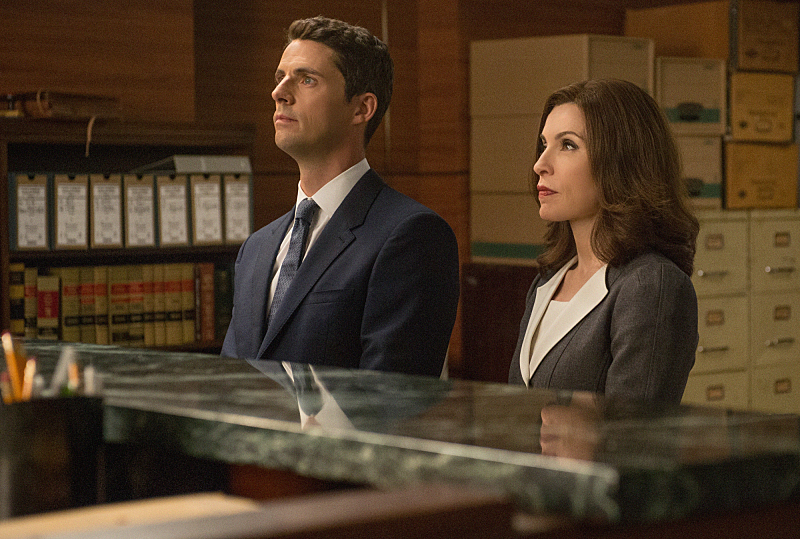
Spoilers for last night’s season-six premiere of The Good Wife below:
“You stay to the right, jackass. That side is for the people, this side is for the scum!”
The amazing thing about Cary’s arrest is that you don’t have any idea what’s going down. Two guns intrude from the sides of the camera frame–is it an attack? A robbery? Are we at war?
The second amazing thing is that–experiencing the arrest from Cary’s perspective–you don’t know what’s happening even once you know what’s happening. What’s often portrayed in law and crime shows as a straightforward procedure becomes, from the standpoint of the arrested, something like an abduction. You don’t know why he’s been picked up. You don’t know the charge.
And you don’t know, by the end of the episode, whether he is in fact innocent.
The season-six premiere of The Good Wife is called “The Line.” This seems to refer, most literally, to the line Cary has to walk in prison, separating “scum” from “people.” The Good Wife has dealt with criminal clients, but we’ve always been on the “people” side of that line, crossing over only as visitors. (The only painted line they have to observe is the one decorously separating lawyers from the judge’s bench.)
Here, disorientingly and instantly, Cary is trapped on the other side of it. He goes through the depersonalizing process of getting a number scrawled on him, getting shouted at for no reason, being reminded that he has lost all liberty. (It’s as if the producers watched Orange Is the New Black and decided: Yeah, we can do that too.) And none of the magic tricks we’re used to seeing, no money or legal maneuvers, will get him out of jail free. (Or for $1.3 million.) He’s stuck, helplessly, on the non-person side of the line.
But “The Line” can also refer to the one that the lawyers of The Good Wife have regularly danced up against–the line separating the merely distasteful or unpleasant from the unethical or illegal. Lemond Bishop is one of the original sins of TGW–the drug dealer whose money Lockhart Gardner, and now Florrick Agos, have taken because it’s money, because everyone deserves representation, because they’re not doing anything illegal… right?
We’d assume that Cary, the onetime prosecutor, would not knowingly give a drug gang advice on trafficking. But part of the power of The Good Wife has come because it never lets us be certain how far its compromised, human lawyers will go, especially for a client they can’t stay afloat without. They might not give him illegal advice. But would they almost give him illegal advice? Would they say something from which an intelligent man could infer something that’s almost as good as illegal advice? (See also: would Peter really steal an election?)
What wouldn’t Cary do, really? What wouldn’t any of our heroes here, really, under the right circumstances, under the right pressures?
Now Cary has gotten on the bad side of one line and possibly of the other. And Alicia and company suddenly have to act in a way that boldly faces a fact they like to skate around: that they are in business with a dangerous gang leader. The first order of business for Alicia to meet with Bishop and ask him, albeit not in so many words: Cary is not going to rat you out, so please don’t have him killed. Bishop doesn’t have him killed–heck, he won’t even have his finger cut off! But the way The Good Wife shows the threat is just about as horrifying for its understatement. Bishop’s man inside explains that they trust Cary, but there still has to be a message, so–all business–he’s going to cut his hand open and Cary is not to say a thing about it, as a “test.”
It’s the way it goes down–the knife, the businesslike cut, the way Matt Czuchry chokes out “guard”–that’s as frightening as anything. In minutes (for us), he’s gone from a business-suited partner, making business deals and plans for drinks, to someone who gets his hand cut open. His body is no longer his. Not on that side of the line. And it may not be for some time, as The Good Wife seems to be setting up a longer-term story–one that has the potential to give Czuchry a showcase.
There was, of course, plenty else going on in this episode of The Good Wife. We picked up immediately with Alicia, as expected, rejecting Eli’s offer to run for State’s Attorney–for now. We had Diane planning to pull an Alicia on her own firm and join Florrick-Agos. (“That sounds familiar,” Alicia remarks.) The Good Wife, like a heavily scheduled professional, comes to each Sunday with a lot of tasks and toggles between briskly like calls on multiple lines. Yet it moves so balletically it never feels like it’s simply knocking items off a checklist. There’s even time for a subplot about Peter’s pantiless intern!
Good to have you back, The Good Wife. As you can see, you have quite a full agenda.
More Must-Reads from TIME
- Inside Elon Musk’s War on Washington
- Meet the 2025 Women of the Year
- The Harsh Truth About Disability Inclusion
- Why Do More Young Adults Have Cancer?
- Colman Domingo Leads With Radical Love
- How to Get Better at Doing Things Alone
- Cecily Strong on Goober the Clown
- Column: The Rise of America’s Broligarchy
Contact us at letters@time.com